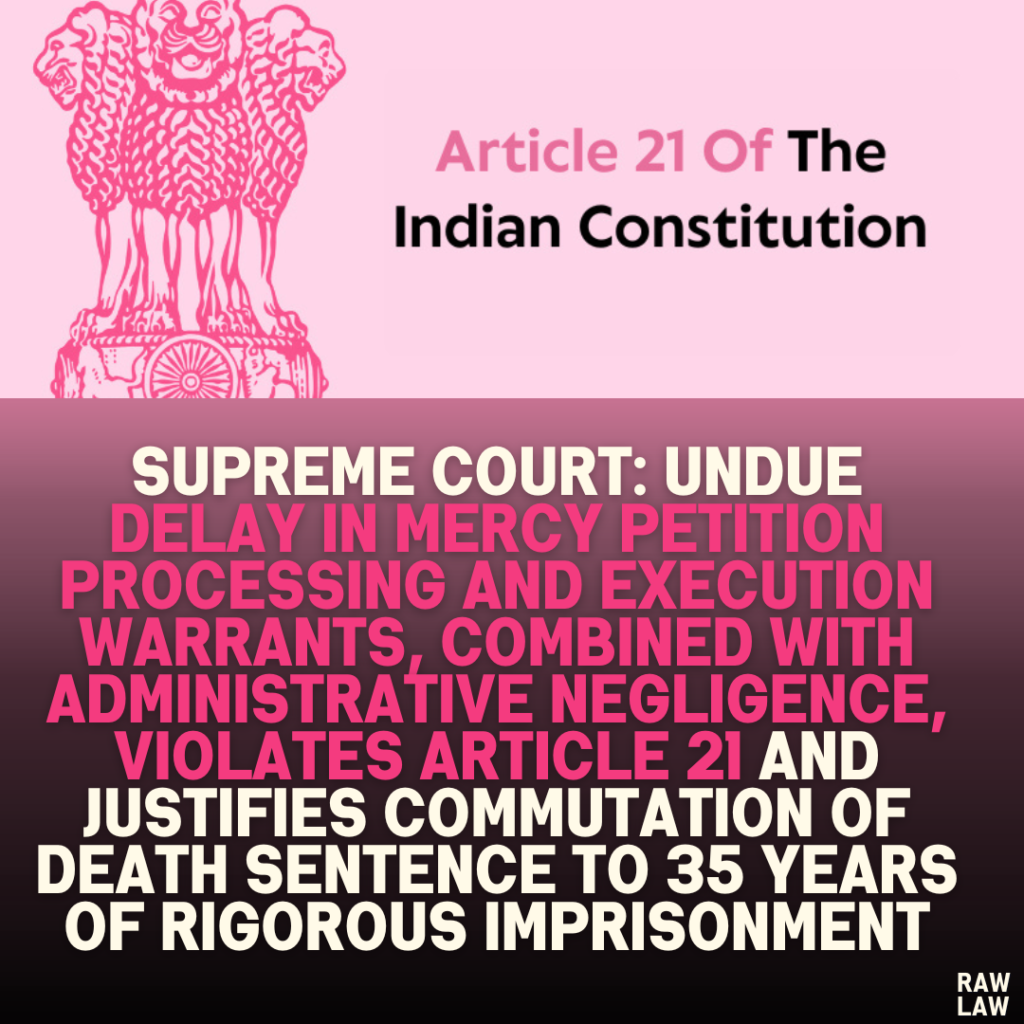Court’s Decision
The Supreme Court upheld the High Court’s decision to commute the death sentences of two convicts to a fixed term of 35 years of imprisonment. The court determined that the delay in processing mercy petitions and issuing execution warrants was unexplained and inordinate, violating the convicts’ fundamental rights under Article 21 of the Constitution. The court emphasized that administrative inefficiencies and procedural delays cannot justify keeping convicts in a prolonged state of uncertainty.
Facts
- Nature of the Crime:
- The convicts were sentenced to death in 2012 for a brutal crime involving rape and murder.
- The case was deemed “rarest of the rare” and upheld by the High Court and Supreme Court in 2012 and 2015, respectively.
- Procedural Timeline:
- Mercy petitions were filed with the Governor of Maharashtra and the President of India following the Supreme Court’s confirmation of the death sentence.
- The mercy petitions were processed over an extended period, leading to a cumulative delay of nearly four years:
- 5 months of delay in the Governor’s office.
- 10 months in the President’s office.
- Over two years in issuing the execution warrant by the Sessions Court.
- Conditions During Delay:
- The convicts alleged that they were subjected to solitary confinement, compounding their mental anguish during the prolonged delay.
- High Court’s Judgment:
- The High Court commuted the death sentence to 35 years of imprisonment, citing violations of Article 21 rights due to the undue delay.
Issues
- Does the delay in processing mercy petitions and issuing execution warrants constitute a violation of Article 21 rights?
- Can delays caused by administrative inefficiencies justify commutation of a death sentence to life imprisonment or a fixed term?
Petitioner’s Arguments
- Delay Justified:
- The State argued that delays in processing mercy petitions were due to procedural complexities and the time required for gathering necessary documentation.
- Quantum of Delay:
- The State contended that the time taken for each stage of the process was not excessive or unreasonable when viewed individually.
- Solitary Confinement Allegations:
- The State denied that the convicts were placed in solitary confinement, instead claiming they were kept in a security yard with access to other inmates and facilities.
Respondent’s Arguments
- Violation of Article 21:
- The convicts argued that the prolonged delay amounted to cruel and inhuman punishment, violating their dignity and rights under Article 21.
- Lack of Diligence:
- They pointed out the State’s failure to act promptly, including unexplained delays in processing mercy petitions and issuing execution warrants.
- Mental Anguish:
- The convicts emphasized the severe mental agony caused by the prolonged uncertainty about their fate.
Analysis of the Law
- Judicial Precedents:
- The court relied on landmark cases such as Triveniben v. State of Gujarat, Shatrughan Chauhan v. Union of India, and B.A. Umesh v. Union of India. These cases affirmed that undue delays in executing a death sentence constitute cruel and degrading punishment, thereby violating Article 21.
- Executive Responsibility:
- The court emphasized that mercy petitions must be processed promptly and that the executive is obligated to prevent unnecessary delays.
- Judicial Safeguards:
- The issuance of execution warrants by Sessions Courts should be timely and must follow proper notice to convicts to ensure procedural fairness.
Precedent Analysis
- No Fixed Period for Delay:
- The court reiterated that no fixed period defines “undue delay”; each case must be evaluated based on its unique facts and circumstances.
- Agony of Prolonged Uncertainty:
- Prolonged delays exacerbate the mental anguish of convicts, undermining their dignity and rights under Article 21.
- Impact of Administrative Lapses:
- The court highlighted that administrative delays caused by executive inefficiencies are unacceptable in cases involving the death penalty.
Court’s Reasoning
- Undue Delay Established:
- The court noted that delays occurred at all three stages:
- Processing of mercy petitions by the Governor (5 months).
- Processing of mercy petitions by the President (10 months).
- Issuance of execution warrants by the Sessions Court (over 2 years).
- The court noted that delays occurred at all three stages:
- Administrative Negligence:
- The court criticized the casual approach of the executive and judicial authorities, which led to cumulative delays of nearly four years.
- Impact on Convicts:
- The prolonged delay and uncertainty inflicted severe mental anguish, amounting to cruel and inhuman punishment.
Conclusion
The Supreme Court upheld the High Court’s commutation of the death sentences to a fixed term of 35 years, citing:
- Unexplained and inordinate delays in the execution process.
- Violations of Article 21 rights due to administrative lapses and procedural inefficiencies.
- The principle that justice delayed is justice denied, even in cases involving heinous crimes.
Implications
- For the Judiciary:
- Reaffirms the duty of courts to ensure prompt action in cases involving the death penalty to prevent procedural delays.
- For the Executive:
- Emphasizes the need for expeditious processing of mercy petitions and adherence to procedural timelines.
- For Human Rights:
- Reinforces the principle that human dignity and constitutional rights must be protected even in cases involving the death penalty.
